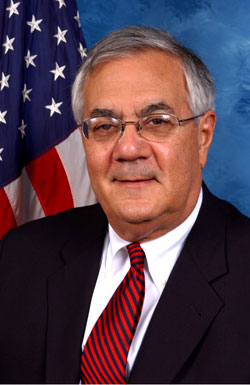ENDA's Absence
Employment bill started strong, but is barely breathing at the close of the 111th Congress
It wasn’t supposed to be like this for the Employment Non-Discrimination Act.
As the members of Congress put in place the final priorities for the lame-duck session of the 111th Congress, nary a word has been heard about the bill – the longest-standing piece of legislation, in one form or another, sought by LGBT advocates.

Rep. Tammy Baldwin (D-Wisc.)
”It’s dead for now,” the bill’s blunt House sponsor, Rep. Barney Frank (D-Mass.), said on Dec. 14.
And things had started so well.
The bill had a hearing in the House Education and Labor Committee, with supportive testimony from the Obama administration. Then, Chairman George Miller (D-Calif.) slated ENDA for a mark-up in the House Education and Labor Committee in November 2009.
But Miller canceled the mark-up and that was, more or less, the last that was heard of the bill, which would prohibit employment discrimination on the basis of sexual orientation and gender identity for most employers with 15 or more employees.
Soon enough, ”Don’t Ask, Don’t Tell” moved to the fore – both in Congress and in the public’s consciousness. By January of this year, it appeared already that the employment measure – which had, albeit without the protection for gender-identity discrimination, been passed previously by the House and come within a vote of passing in the Senate – had taken a back seat to ending the 1993 law banning openly gay or lesbian military service.
Even the spokesman for House Speaker Nancy Pelosi (D-Calif.) acknowledged this week, ”The long-agreed-upon order was hate crimes; ENDA; ‘Don’t Ask, Don’t Tell.”’
But, speaking with Metro Weekly, Pelosi spokesman Drew Hammill said, ”We then went into health care, and obviously that took much longer than anticipated.”
As Frank acknowledged, ”One of the things that delayed [ENDA] was the health bill – because it was in the same committee.”
Then, Hammill said, ”There were issues with the motion to recommit.”
Explaining the ”issues,” he said, ”Everyone thought we had the votes on the underlying measure, but it depended on what language the GOP [brought up] on the motion to recommit.
”Many felt it would be a troublesome sign to take it to the floor and not to be able to overcome the motion to recommit.”
Frank expanded upon that, adding some specificity to the fears, saying, ”What they were worried about was a motion to recommit, like saying that an elementary school teacher can’t transition in the middle of the year.”
But, as Rep. Tammy Baldwin (D-Wisc.) explained, ”[O]ur vote counts – for two sessions in a row – we didn’t reach the same conclusion [as the House Democratic leadership] about the confidence in, not so much passage, but being able to defeat a motion to recommit.”
A House Democratic leadership aide, who asked not to be named to present an open assessment of the whip process, criticized the count of members or the advocacy organizations, saying, ”You’d have the whip check it or the speaker check it, and it wasn’t there. At the end of the day, there were serious problems with the motion to recommit. People who they had on the list, people who signed on as co-sponsors because they never thought it would come to the floor…. The ‘yes’ was not there.”
Baldwin said, however, ”I don’t question the accuracy of the information I have. I also think there’s a reason why there wasn’t a complete match-up.”
To explain, she said, ”The conversation that individual has with the leadership whip team may not end up with his revealing how he’s going to vote. He may simply say, ‘I’m asking you, as leaders, don’t bring this up. Don’t make me take this vote. You’re the ones who decide.”’
But, when she or other members press them for how they would vote, she said, they get an answer, and she had a good deal of confidence in the ability to defeat a motion to recommit related to the gender-identity protections.
Frank was not as sure, saying, ”I’m not confident how it would have turned out. I think people in the community underestimate the opposition.” He added that, without the gender-identity provisions, ”We clearly have the votes for that.”
Baldwin concluded, though, ”I certainly articulated, both sessions, that I felt we should move forward. I know others shared that.” Frank, despite his reservations, agreed. ”I wanted to go to the floor,” he said. ”I agreed with Tammy.”
Hammill disputed that characterization as being antagonistic to the speaker’s position, saying, ”Everyone wanted to go forward. I don’t think I disagree with that at all.”
But, he added, ”As you well know, and she’s said this a number of times, moving on two priorities at the same time would be problematic and could endanger the outcome of both.”
The National Gay and Lesbian Task Force’s executive director, Rea Carey, fought back against that premise.
”They are smart enough to walk and chew gum at the same time,” she said. ”These two bills have been in play for years, and there are other examples of Congress taking up two similar bills at the same time.”
As to that, though, Hammill said, ”There was a decision made with some of the groups – some of them wanted to move forward with ‘Don’t Ask, Don’t Tell.”’
National Center for Transgender Equality Executive Director Mara Keisling said that, if such a decision was made, that was unacceptable. ”The problem,” she said, ”is that they were signaled that it was okay to pick one over the other.”
Outside of DADT-specific organizations, neither the Human Rights Campaign nor the Task Force acknowledged pushing DADT repeal in front of ENDA.
HRC spokesman Fred Sainz said, ”I can tell you that HRC was not that group. Our position was always that both should proceed.” Asked whether HRC officials had, in a lesser way, acknowledged that the LGBT community would approve of DADT repeal being prioritized over ENDA, Sainz said, ”No choice was ever made between two important priorities. There was a path forward, tied to a process, with DADT repeal.”

Rep. Barney Frank (D-Mass.)
Carey said, ”The Task Force did not express, to any member of Congress in any way, that ‘Don’t Ask, Don’t Tell’ should move forward at the expense of ENDA.” She added that it is the ”responsibility” of LGBT organizational leaders is to ”push … to make sure that the needs of LGBT people are tended to” – in multiple areas at the same time.
Further, said Carey, regarding the political strategies employed, ”Neither has been enacted. That’s the real problem.”
As to the specter of a lame-duck vote on ENDA, which had been floated as a possibility throughout the summer and fall, Baldwin said, ”If I were to give you my best opinion on this, [chances of a lame-duck ENDA vote] disappeared when it became clear that if we had any chance of repealing ‘Don’t Ask, Don’t Tell,’ that that would happen in the lame duck.”
Carey added, however, ”We all appear to be hindered by the reticence of the speaker’s office to move forward on an inclusive ENDA.”
Keisling was more specific.
”It had to do with there being staff members in leadership who were afraid of the trans part,” she said. ”And leadership stalled on it. They stalled and they stalled.”
Other LGBT advocates concurred, with different advocates pointing to varying members of the Democratic leadership team as the individuals most responsible for holding back the bill from a vote. All, though, acknowledged that the motion to recommit was the main concern and that, because of that, Pelosi was unwilling to bring the bill to a vote.
Hammill, however, also noted another major concern for the speaker’s office, saying, ”Possibly we could get it out of the House, but I don’t think anyone sees a path in the Senate.”
HRC’s Sainz and others acknowledged that the lack of a path for ENDA’s passage in the Senate was a major obstacle to getting movement in the House.
As Hammill put it, ”Obviously, it’s a disappointment, but you have Republicans blocking over 420 bills that the House has passed.”
Hammill went down the list of Democratic complaints about Republican intransigence in the Senate, concluding, ”They extend the time that every piece of legislation takes to pass. And, they’re not interested in equality.”
R. Clarke Cooper, executive director of Log Cabin Republicans, took issue with Hammill’s remarks, saying, ”Having it not been calendared or advanced … it’s kind of hard to do a ‘coulda, woulda, shoulda.’ But … I didn’t get any negative response to ENDA.”
”It’s a cop-out to say there weren’t votes. There were,” he said. ”There are members out there who are more comfortable with ENDA than with ‘Don’t Ask, Don’t Tell.”’
Asked what those supportive of ENDA should do in the 112th Congress, Frank concurred, in a sense, with Hammill’s comments, saying, ”It’s dead until the Democrats retake the House.”
Carey responded similarly: ”It looks like we don’t have votes to move forward on any LGBT-specific legislation in the coming year, which makes it particularly disappointing that Congress didn’t take care of LGBT people’s business in the past year.”
Cooper, unsurprisingly, was more optimistic, noting that LCR – for the first time – had been invited to participate in a meeting on Dec. 15 of Republican organization heads with the House Republican Study Committee, headed by Rep. Jim Jordan (R-Ohio).
”There is opportunity there. To say there is no support or will, I would say, is not accurate,” Cooper said. ”We have 17 folks we endorsed, 12 of them are going to be in Congress in January, and they all support ENDA.”
Jordan, however, is not one of them.
Despite Obama’s ”continue[d] support” of the legislation, White House spokesman Shin Inouye did not sound hopeful about passage of the bill in the near future, telling Metro Weekly of the president’s view, ”As the public continues to learn about the need for this legislation, he hopes that Congress will take on this issue to help bring fairness and equality to our nation’s laws.”
As to that education, Frank had a message for LGBT advocates, saying, ”In the interim what the community needs to do is educate on the transgender issue.”
The point was echoed by the Democratic leadership aide, who said ”there has not been the work done by the community in the Senate” to ensure the passage of an inclusive ENDA.
As Frank said, ”I would point out to you that they still have not been able to get transgender protections in liberal places. If you can’t do it in Massachusetts, New York and Maryland, it doesn’t get easier when you add in South Dakota, Oklahoma and Utah.”
Support Metro Weekly’s Journalism
These are challenging times for news organizations. And yet it’s crucial we stay active and provide vital resources and information to both our local readers and the world. So won’t you please take a moment and consider supporting Metro Weekly with a membership? For as little as $5 a month, you can help ensure Metro Weekly magazine and MetroWeekly.com remain free, viable resources as we provide the best, most diverse, culturally-resonant LGBTQ coverage in both the D.C. region and around the world. Memberships come with exclusive perks and discounts, your own personal digital delivery of each week’s magazine (and an archive), access to our Member's Lounge when it launches this fall, and exclusive members-only items like Metro Weekly Membership Mugs and Tote Bags! Check out all our membership levels here and please join us today!





















